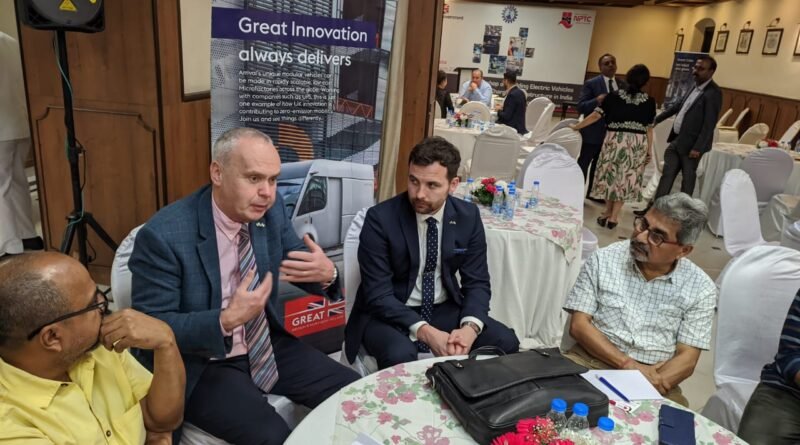UK and West Bengal partner on Electric Vehicles Skill Development
Kolkata March 21 dmanewsdesk: NPTC Group of Colleges, Wales-UK and British Deputy High Commission, Kolkata and West Bengal State Council of Technical & Vocational Education and Skill Development, in partnership with NPTC Group of Colleges Wales, UK, which specialises in training on Electric Mobility, organised the first-ever workshop on Building Electric Vehicles Charging Infrastructure in India”. The Foreign Commonwealth and Development Office of the UK Government supported the programme. Due to their low tailpipe emissions, electric vehicles are a sustainable mode of transportation, and their widespread adoption may help society reach its net- zero emissions goals.
S Suresh Kumar, ACS Power Department West Bengal, inaugurated the event. A report on Capacity Building for Electric Vehicles and the Charging Infrastructure in India Opportunities and learnings from the UK was released at the event. Leading stakeholders from the state government, Kolkata Municipal Corporation, Energy Distribution companies, renewable energy organisations and e-vehicle operators and manufacturers attended this workshop.
Mr James Llewellyn, Head of International Operations, NPTC Group of Colleges and
Mr Wyn Prichard, Net Zero Expert, NPTC Group of Colleges; Mr Peter Cook, Acting British Deputy High Commissioner to East and Northeast India; Sri S. Suresh Kumar, IAS, Additional Chief Secretary, Department of Power, Government of West Bengal, Mr Anoop K Agrawal, Principal Secretary, Department of Technical Education, Training and Skill Development, Government of West Bengal were present along with Mr. R V S Kapur, Managing Director, West Bengal State Transport Department.
Peter Cook, British Deputy High Commissioner to East and Northeast India said, “Skill development in Electric Mobility space is an important component contributing to a net zero strategy and will help the creation of new green jobs and usher in EV investment. The UK Government is keen to deepen our engagement with West Bengal through the creation of an EV Skills Roadmap and a wider knowledge exchange with UK experts to help drive forward West Bengal’s EV Policy. Collaborations like these will help to create the highly skilled, dynamic transport workforce that Bengal will need in the future”.
James Llewellyn, Head of International Operations for the NPTC Group of Colleges, said, “As a premier training and education provider, NPTC Group is pleased to work with India to develop the skills and capacity for electric vehicle charging infrastructure. Creating a greener future demands collaboration, and we look forward to working with India to achieve this objective.”
Wyn Prichard (Expert in Net Zero, NPTC Group of Colleges) said, “At NPTC, we think developing skills and capacity for electric car charging infrastructure is crucial for a sustainable future. We are eager to share our knowledge and expertise in this field and collaborate with India to create a more sustainable future.”
S Suresh Kumar, ACS Power said “it is crucial that technical support is available for the EV Charging Infrastructure as well as for maintenance of EVs. Skill development is crucial for maintenance as well as for EV manufacturing. The Centre of Excellence will introduce innovation and this will help in the dynamic development of infrastructure and manufacturing. The Technical Education and Skill Development Department is the right destination for the CoE which will come through with the technical assistance of the UK Government.”
Rajanvir Singh Kapur, the MD of WBTC said, “As we transition towards an era of electric mobility, it’s imperative to upskill the manpower to deal with the new technologies. We need to equip the cutting edge like the drivers, the mechanics and the people who will deal with batteries. “
Anoop K Agrawal, Principal Secretary, Department of Technical Education, Training and Skill Development, Government of West said “The WB was the first state to launch E Vehicle courses for Diploma Engineers in 2021. Course was developed in partnership with GIZ. Many from the 1st batch of students are currently engaged with TATA Motors. The move now is to skill manpower across levels of skills required for managing the transition to E vehicles. The focus would be on fresh students as well as the existing workforce through upskilling and re-Skilling. This workshop with Govt of UK to understand the scope and expanse of Skilling is the first of its kind. Govt of WB may also explore working with Govt of UK on getting the knowledge and technology transfer for the creation of a Center of Excellence on E vehicle and E vehicle Skilling hub for East Nd North East India.”
The report released at the event underscores the crucial importance of collaboration among different stakeholders, such as industry players, education providers, and policymakers, to facilitate the creation and delivery of relevant and practical training and skills development programmes. States and cities adopt a clean growth strategy to achieve the Net Zero goal. Today’s Kolkata programme forms part of a wider endeavour to enhance the charging infrastructure and EV skills in East and Northeast India. The event aims to share best practices and develop a comprehensive roadmap for advancing EV skilling and charging infrastructure, thereby contributing to the success of this initiative.
One of the key focus areas of the event was sharing best practices on the Electric Vehicle Charging Infrastructure Ecosystem and Electric Vehicles Skilling for Service and Maintenance of the vehicle. There was a substantial discussion over the global challenges faced in this area and ways to overcome them.




